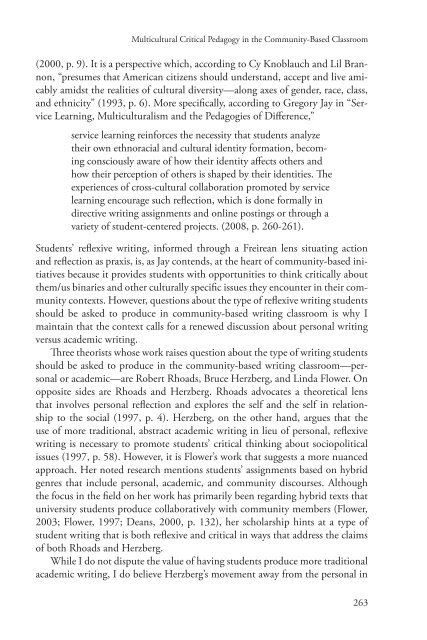Critical Expressivism- Theory and Practice in the Composition Classroom, 2014a
Critical Expressivism- Theory and Practice in the Composition Classroom, 2014a
Critical Expressivism- Theory and Practice in the Composition Classroom, 2014a
You also want an ePaper? Increase the reach of your titles
YUMPU automatically turns print PDFs into web optimized ePapers that Google loves.
Multicultural <strong>Critical</strong> Pedagogy <strong>in</strong> <strong>the</strong> Community-Based <strong>Classroom</strong><br />
(2000, p. 9). It is a perspective which, accord<strong>in</strong>g to Cy Knoblauch <strong>and</strong> Lil Brannon,<br />
“presumes that American citizens should underst<strong>and</strong>, accept <strong>and</strong> live amicably<br />
amidst <strong>the</strong> realities of cultural diversity—along axes of gender, race, class,<br />
<strong>and</strong> ethnicity” (1993, p. 6). More specifically, accord<strong>in</strong>g to Gregory Jay <strong>in</strong> “Service<br />
Learn<strong>in</strong>g, Multiculturalism <strong>and</strong> <strong>the</strong> Pedagogies of Difference,”<br />
service learn<strong>in</strong>g re<strong>in</strong>forces <strong>the</strong> necessity that students analyze<br />
<strong>the</strong>ir own ethnoracial <strong>and</strong> cultural identity formation, becom<strong>in</strong>g<br />
consciously aware of how <strong>the</strong>ir identity affects o<strong>the</strong>rs <strong>and</strong><br />
how <strong>the</strong>ir perception of o<strong>the</strong>rs is shaped by <strong>the</strong>ir identities. The<br />
experiences of cross-cultural collaboration promoted by service<br />
learn<strong>in</strong>g encourage such reflection, which is done formally <strong>in</strong><br />
directive writ<strong>in</strong>g assignments <strong>and</strong> onl<strong>in</strong>e post<strong>in</strong>gs or through a<br />
variety of student-centered projects. (2008, p. 260-261).<br />
Students’ reflexive writ<strong>in</strong>g, <strong>in</strong>formed through a Freirean lens situat<strong>in</strong>g action<br />
<strong>and</strong> reflection as praxis, is, as Jay contends, at <strong>the</strong> heart of community-based <strong>in</strong>itiatives<br />
because it provides students with opportunities to th<strong>in</strong>k critically about<br />
<strong>the</strong>m/us b<strong>in</strong>aries <strong>and</strong> o<strong>the</strong>r culturally specific issues <strong>the</strong>y encounter <strong>in</strong> <strong>the</strong>ir community<br />
contexts. However, questions about <strong>the</strong> type of reflexive writ<strong>in</strong>g students<br />
should be asked to produce <strong>in</strong> community-based writ<strong>in</strong>g classroom is why I<br />
ma<strong>in</strong>ta<strong>in</strong> that <strong>the</strong> context calls for a renewed discussion about personal writ<strong>in</strong>g<br />
versus academic writ<strong>in</strong>g.<br />
Three <strong>the</strong>orists whose work raises question about <strong>the</strong> type of writ<strong>in</strong>g students<br />
should be asked to produce <strong>in</strong> <strong>the</strong> community-based writ<strong>in</strong>g classroom—personal<br />
or academic—are Robert Rhoads, Bruce Herzberg, <strong>and</strong> L<strong>in</strong>da Flower. On<br />
opposite sides are Rhoads <strong>and</strong> Herzberg. Rhoads advocates a <strong>the</strong>oretical lens<br />
that <strong>in</strong>volves personal reflection <strong>and</strong> explores <strong>the</strong> self <strong>and</strong> <strong>the</strong> self <strong>in</strong> relationship<br />
to <strong>the</strong> social (1997, p. 4). Herzberg, on <strong>the</strong> o<strong>the</strong>r h<strong>and</strong>, argues that <strong>the</strong><br />
use of more traditional, abstract academic writ<strong>in</strong>g <strong>in</strong> lieu of personal, reflexive<br />
writ<strong>in</strong>g is necessary to promote students’ critical th<strong>in</strong>k<strong>in</strong>g about sociopolitical<br />
issues (1997, p. 58). However, it is Flower’s work that suggests a more nuanced<br />
approach. Her noted research mentions students’ assignments based on hybrid<br />
genres that <strong>in</strong>clude personal, academic, <strong>and</strong> community discourses. Although<br />
<strong>the</strong> focus <strong>in</strong> <strong>the</strong> field on her work has primarily been regard<strong>in</strong>g hybrid texts that<br />
university students produce collaboratively with community members (Flower,<br />
2003; Flower, 1997; Deans, 2000, p. 132), her scholarship h<strong>in</strong>ts at a type of<br />
student writ<strong>in</strong>g that is both reflexive <strong>and</strong> critical <strong>in</strong> ways that address <strong>the</strong> claims<br />
of both Rhoads <strong>and</strong> Herzberg.<br />
While I do not dispute <strong>the</strong> value of hav<strong>in</strong>g students produce more traditional<br />
academic writ<strong>in</strong>g, I do believe Herzberg’s movement away from <strong>the</strong> personal <strong>in</strong><br />
263


















